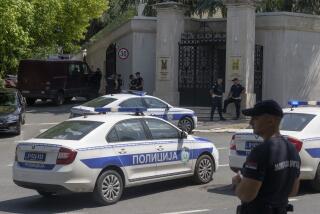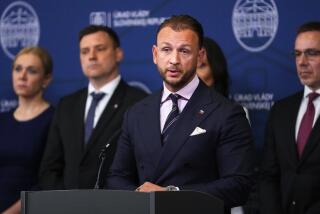Yugoslav Army Detains Bosnian President : Balkans: The Serb-led federal troops launch an attack on Sarajevo. An EC monitor is killed elsewhere, jeopardizing the peace talks.
- Share via
VIENNA — The Serbian-controlled Yugoslav federal army Saturday launched a massive attack on Sarajevo, capital of newly independent Bosnia-Herzegovina, and detained the republic’s Muslim president in a move likely to enrage the embattled population.
A European Community monitor from Belgium was killed elsewhere in the war-torn republic, prompting senior diplomats from the Western bloc to say they would have to reconsider their role in the intensifying Balkan conflict.
There were reports of heavy casualties in Sarajevo, and army officers said in radio broadcasts that Bosnia-Herzegovina was engulfed in “full-scale war.”
The Belgrade-based Tanjug news agency reported a new cease-fire agreement just before midnight, but the latest in a series of shaky truces was expected to have little effect in light of the army’s capture of republic President Alija Izetbegovic.
Izetbegovic had been pressured by Serbian politicians into leaving Sarajevo for EC-brokered peace talks in Portugal last week. His detention upon return to Sarajevo raised immediate suspicion that he had been set up.
Muslims are the most numerous ethnic group among Bosnia-Herzegovina’s 4.4 million people, and Izetbegovic is revered by many for having sought to preserve the republic’s once tolerant, multinational character against Serbian insistence that it be carved up.
“As far as I can tell, I’m being held prisoner,” Izetbegovic said in a broadcast on Sarajevo TV.
A Serbian army general contended that Izetbegovic was being held for his own protection because of the heavy fighting around Sarajevo airport. But his concern rang hollow in a city where dozens of civilians have been killed in a two-month barrage of mortar and artillery fire by Serbian forces.
The president’s arrest followed a day of intense fighting sparked by federal air force attacks on the capital. It was the first time troops of the Yugoslav army--now almost exclusively Serbian--openly took part in street battles in Sarajevo.
Their move against the capital, coupled with the detention of Izetbegovic, appeared to bear out Muslim and Croatian assertions that the army has fully joined the side of Serbian guerrillas who have gone to war against Bosnia-Herzegovina’s decision to break away from the Serbian-dominated remnants of Yugoslavia.
Sarajevo officials have estimated the number of federal troops in the republic at 150,000.
EC talks aimed at restoring peace in the republic and reorganizing it into Muslim, Serbian and Croatian cantons were suspended last week, after Izetbegovic’s arrival, because of repeated violations of a declared cease-fire. EC diplomats at the talks in the Portuguese capital of Lisbon deemed it pointless to discuss the future administrative shape of Bosnia-Herzegovina while military assaults to take territory were under way.
Portugal’s Jose Cutileiro, mediator of the Lisbon talks, told journalists that the federal army and Serbian forces had failed to comply with the terms of an April 12 cease-fire that required them to dismantle artillery and lift their blockades around predominantly Muslim cities.
Serbian vigilantes, many of them from Belgrade-based nationalist militias, began pouring into Bosnia-Herzegovina shortly after the majority of the republic voted for independence in a Feb. 29 referendum. More than two-thirds of eligible voters endorsed secession. But many Serbs, who account for about 31% of the population, wanted to remain part of Yugoslavia and have taken up arms to protest the majority’s vote.
The guerrillas have driven hundreds of thousands from their homes in the campaign to frustrate Bosnian independence, boosting the number of refugees from the nearly year-old Yugoslav conflict to more than 1 million--the largest forced migration in Europe since World War II.
Serbs and their patrons in Belgrade want control of large areas of Bosnia-Herzegovina so they can link them with seized areas of Croatia and annex the whole region to the new Yugoslav state proclaimed last week by Serbia and Montenegro.
No foreign country has yet recognized the truncated Yugoslavia, insisting that the Belgrade-based army first withdraw from Bosnia-Herzegovina and that the new state agree to respect the sovereignty of its Balkan neighbors.
Slovenia, Croatia and Bosnia-Herzegovina have won recognition by the United States, EC countries and other Western nations. Macedonia has also declared independence, but diplomatic ties are being held up by a dispute with Greece over the new republic’s right to its name. Greece has a northern province called Macedonia, and Athens contends that the former Yugoslav republic would harbor territorial aspirations if allowed to use its current name.
Saturday’s escalation in the fighting that has already claimed at least 300 lives in Bosnia-Herzegovina might signal a determination by the Serbian forces to make an all-out move to take the predominantly Muslim capital of Sarajevo.
The volatile leader of the republic’s Serbian community, Radovan Karadzic, had been pressing his campaign for ethnic cantonization of Bosnia-Herzegovina with an eye toward annexing Serbian-dominated areas to the new Yugoslavia, or Greater Serbia.
Once the EC talks were indefinitely suspended, the chances of winning foreign endorsement of the carve-up of Bosnia-Herzegovina dimmed, removing one of the Serbs’ last inducements to negotiate rather than fight.
In the Croatian capital of Zagreb, EC spokesman Joao da Silva said a Belgian observer had been killed in the southern Bosnian village of Cula. A Croatian national guardsman, Ivan Zovko, told reporters he saw federal soldiers shoot the EC monitor in the stomach as he tried to negotiate the reopening of a power plant.
Five EC monitors were killed in January when a federal air force pilot rocketed their clearly marked helicopter.
In light of the latest fatality and the intensifying fighting in Bosnia-Herzegovina, Dutch Foreign Minister Hans van den Broek said the EC would have to rethink its mission in the volatile region.
More to Read
Sign up for Essential California
The most important California stories and recommendations in your inbox every morning.
You may occasionally receive promotional content from the Los Angeles Times.














